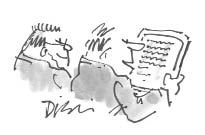It’s that time of year. The great reckoning is upon us. Insurance is being renewed. Tax returns are being ferreted out. Roofing jobs are being appraised and budgeted for. And spouses are being trundled into central London for the annual session of dialysis at the theatre.
It’s that time of year. The great reckoning is upon us. Insurance is being renewed. Tax returns are being ferreted out. Roofing jobs are being appraised and budgeted for. And spouses are being trundled into central London for the annual session of dialysis at the theatre. And here to meet them is Ayckbourn’s yuletide comedy Seasons Greetings, which features three hilariously miserable families bickering their way through the festival of ill-will.
Ayckbourn is the Christmas blow-out of dramatists. The ingredients require little creative input as long as they’re presented in the right order. And the ritual inspires a general suspension of critical faculties so everyone leaves replete, reassured and quietly grateful that the ceremony won’t recur for another 12 months. His suburban world and his hatchback-class characters never vary so it came as a surprise to see a real flash of inspiration in this play. The climax of the second act must rank as one of the great moments of stage comedy.
An adulterous couple, trying to snatch an illicit quickie under the Christmas tree at midnight, accidentally set off a mechanical toy whose rat-a-tat-tat wakes the entire house, and as the roused sleepers descend the stairs they find the embarrassed pair ripping open the presents frantically trying to locate the source of the noise. Rumbled, the adulterers explain, ‘We couldn’t wait to open our presents.’ Why is that great? It’s believable, it’s silly and it violates a revered ceremony. (And, believe it or not, the third act climax manages to surpass it.) It wouldn’t surprise me if Ayckbourn wrote the entire play in order to bring the audience to these two hilarious peaks. The trouble is it’s quite a slog up the foothills.
As ever his narky suburbanites blunder around in a permanent mood of garrulous irascibility and he relies on stupidity, obsessive behaviour and dysfunctional gadgets for comic effects. He deliberately damages each character to give them roughness and interest, like a chef blasting a crème brûlée with a blowtorch to create the fragile crispiness which makes it more than just a lump of sweetened goo. Deficiency defines them. Not always convincingly.
A needy depressive named Bernard builds a toy theatre and rehearses a 17-act puppet drama to entertain the other characters’ children. Why? Because he has no children. This big-fist approach to psychology is typical of Acykbourn and of the contract he has with the audience. He appeals to the sadistic nosey parker in us, the bit that slows down to watch the aftermath of a pile-up on the other carriageway. He invites us to cackle at impairment rather than aim for self-knowledge, and to think worse of others, not better of ourselves.
Yet he inspires a strange virility contest between critics who like to outbid each other in their claims for his genius. Molière, Racine, Chekhov and even Shakespeare have all been nominated as his equals. Chekhov? It’s inconceivable that a figure in an Ayckbourn play could elucidate, with frosty precision, the detachment of professional writers, or analyse the corrupting appeal of alcohol, or find beauty and truth in a visionary speech about forestry.
And Shakespeare? Well, maybe for Comic Relief. Get Ayckbourn to rewrite Hamlet and, hey presto, the prince is an amateur Scandinavian lens-grinder with a 2:2 from Wittenberg Polytechnic who woos Ophelia by showing her his designs for a flying machine which, in act four, he heroically attempts to get airborne from the battlements of Elsinore before crash-landing in the moat. The sitcom world of Ayckbourn has a poverty of spiritual ambition, a self-satisfied cultural inertia which puts me in mind of the least elevating noise the television era has ever produced: the opening credits to The Likely Lads.
But the performances in Marianne Elliott’s production cheered me a great deal. Catherine Tate leads the cast as Belinda, a frustrated middle-aged sexpot. Curious talent, Tate. Highly versatile as a mimic, she has to conceal herself under a great encrustation of wiggery, costume-work and comic accentation before she feels comfortable enough to transform herself. Here she wears her routine civvies and gives her routine performance, as a horsey nympho with a twinkle in her eye, which works a treat. Neil Stuke is excellent as her spiky, boorish husband, and Oliver Chris is floppily effective as Clive, a novelist, whose exotic status as an artist stirs predictable over-reactions from Ayckbourn’s small-minded cretins. The women treat him with obtuse reverence, the men with suspicion and violence.
The auditorium was full of noise throughout. Much coughing, and much laughter, too, albeit the look-how-much-I’m-enjoying-this-play-thank-you-darling laughter. The show runs for two and a half hours. It’s sensationally funny for two and a half minutes.







Comments